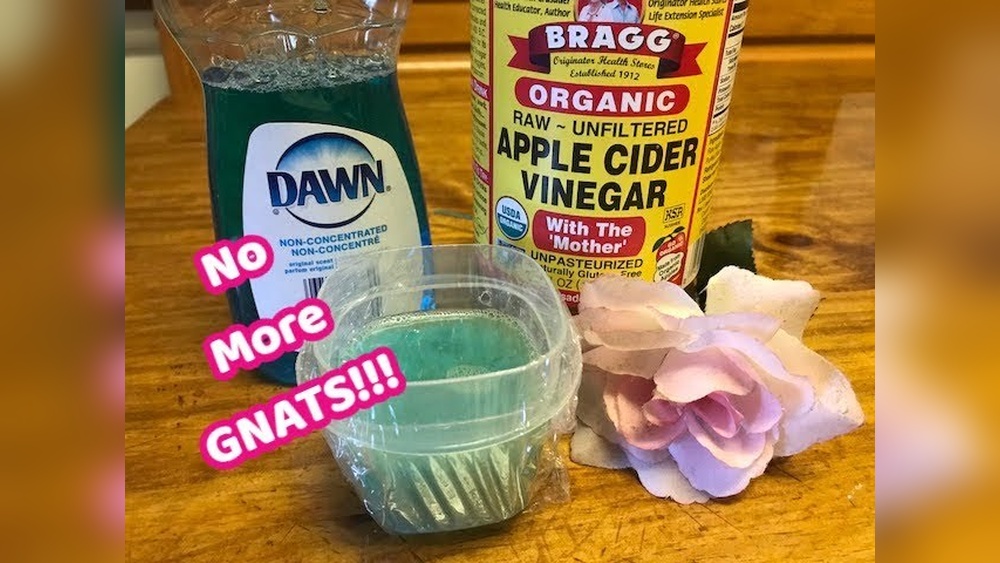Are tiny gnats invading your kitchen and driving you crazy? These pesky little flies can appear out of nowhere, buzzing around your fruit bowls, sink, and plants, making it hard to enjoy your space.
But don’t worry—you’re not stuck with them. You can take simple, effective steps to get rid of gnats for good and keep your kitchen fresh and clean. Keep reading to discover easy tricks and natural remedies that will help you regain control and say goodbye to those annoying gnats once and for all.
Your kitchen deserves to be a gnat-free zone!

Sources Of Gnats In Kitchen
Organic matter in drains is a common source of gnats. Food scraps and grease build-up create perfect breeding spots. Regular cleaning helps stop their growth.
Unsealed fruits and vegetables attract gnats easily. Overripe or damaged produce gives them food and shelter. Store fruits in the fridge or sealed containers.
Leaky pipes and moisture keep the environment damp. Gnats need moisture to survive and lay eggs. Fix leaks and dry wet areas promptly to reduce their numbers.
Dirty trash cans and compost provide food and warmth. Rotting waste is a favorite place for gnats to thrive. Empty and clean trash cans often to avoid infestations.

Essential Oils To Repel Gnats
Peppermint and eucalyptus sprays work well to keep gnats away. Add a few drops of peppermint oil to water and a little soap in a spray bottle. Spray around windows, doors, and plant soil. Eucalyptus oil also repels gnats and can be used as a spray or in candles. The strong scent confuses and drives them off.
Citronella candles and torches are great for outdoor spaces. Lighting citronella candles or tiki torches helps keep gnats at bay. The smell is unpleasant to gnats but nice for humans.
Lavender and rosemary plants can be grown indoors or outdoors. Lavender plants or lavender-scented candles work well. Rosemary sprigs placed near plants or in closets also help. These herbs create a natural barrier that gnats dislike.
Vanilla and apple cider vinegar add extra protection. Diluted vanilla lotion or spray on skin keeps gnats away from your personal space. Apple cider vinegar traps gnats when placed in a bowl with a little dish soap. They get stuck and drown.
Diy Gnat Traps
Apple cider vinegar traps are simple and very effective. Pour apple cider vinegar into a small bowl. Cover it tightly with plastic wrap. Poke small holes in the wrap using a toothpick. Gnats enter through holes but cannot escape.
The wine or beer trap works similarly. Use a small amount of red wine or beer in a jar. Cover the jar with plastic wrap and poke holes on top. Gnats are attracted to the smell and get trapped inside.
For a fruit trap with plastic wrap, place a piece of ripe fruit in a bowl. Cover it with plastic wrap and poke holes. Gnats fly in to eat but cannot leave. Change traps every few days to keep them fresh and effective.
Cleaning Tips To Eliminate Gnats
Scrubbing kitchen drains removes gunk where gnats breed. Use a stiff brush and hot water weekly. This stops eggs and larvae from growing. Clean drains keep the kitchen fresh and gnat-free.
Sealing fruits and vegetables stops gnats from reaching food. Store them in airtight containers or the fridge. Avoid leaving ripe fruit on counters for too long.
Fixing leaks and moisture control is key because gnats love damp places. Check under sinks and around pipes. Wipe wet spots quickly to keep areas dry.
Regular trash disposal means taking out garbage daily. Use a bin with a tight lid. Clean trash bins often to remove any spills or smells.
Natural Remedies And Sprays
Garlic water spray works well to keep gnats away. Crush a few garlic cloves and soak them in water overnight. Strain the water and pour it into a spray bottle. Spray this solution on kitchen surfaces and plants. The strong smell repels gnats effectively.
Cinnamon powder on soil helps stop gnats from laying eggs. Sprinkle cinnamon lightly on the surface of your plant pots. The powder acts as a natural barrier and stops gnats from breeding. It also keeps the soil dry and less attractive to bugs.
Soapy water sprays trap and kill gnats quickly. Mix a few drops of mild dish soap with water in a spray bottle. Spray directly on gnats and areas where they gather. The soap breaks the bug’s outer layer, causing them to die fast.
Cooking oil barrier can block gnats from entering your plants. Dab a small amount of vegetable oil on the edges of pots or windowsills. The sticky oil stops gnats from crawling or flying inside. Use this method carefully to avoid harming plants.
Preventive Measures
Store food properly in sealed containers. This stops gnats from smelling and reaching it. Keep fruits and vegetables in the fridge if possible. Avoid leaving food out in the open for long.
Eliminate standing water by checking sinks, drains, and plant pots. Even small amounts can breed gnats. Dry wet areas often to prevent them from multiplying.
Clean all kitchen surfaces every day. Wipe counters, tables, and floors to remove crumbs and spills. This reduces places where gnats can feed and hide.
Use fans or open windows for air circulation. Moving air stops gnats from flying freely. It also helps dry out damp spots where they breed.
:max_bytes(150000):strip_icc()/how-to-get-rid-of-gnats-in-your-home-5207918_final-41fa648920424fe9a9177585aef3d3fc.png)
Frequently Asked Questions
What Smell Do Gnats Hate?
Gnats hate smells like peppermint, eucalyptus, citronella, lavender, vanilla, and vinegar. These scents repel them effectively.
What Causes Gnats In The Kitchen Sink?
Gnats in the kitchen sink appear due to food residue, organic matter, and moisture buildup. Drain clogs and dirty disposal attract them.
What Is The Best Diy Gnat Killer?
The best DIY gnat killer uses apple cider vinegar traps combined with peppermint or eucalyptus essential oil sprays. Sprinkle cinnamon on plant soil to kill fungus gnats. Regularly clean surfaces and avoid overwatering plants to prevent gnat breeding.
Why Are Gnats So Bad In The Kitchen?
Gnats thrive in kitchens due to food scraps, moisture, and organic matter. They spread bacteria and contaminate food, causing hygiene issues.
Conclusion
Getting rid of gnats in your kitchen takes patience and simple steps. Keep your kitchen clean and dry to stop them from breeding. Use natural sprays with essential oils like peppermint or eucalyptus to repel gnats. Set traps with apple cider vinegar to catch and reduce their numbers.
Regularly check plants and remove any overwatered soil to prevent fungus gnats. Small actions every day make a big difference. Soon, your kitchen will be free from these annoying pests. Stay consistent and enjoy a fresh, gnat-free space.

Yes, working as , Food Blogger and Product Reviewer for last 6 years. Here you will get amazing deals for Smart kitchen products. I am your best source for the latest update in cooking trends. I provide insightful articles, reviews, and analysis on cutting-edge kitchen gadget. My mission is to empower readers with the knowledge they need to stay ahead in a rapidly evolving coking world. Join me as we explore the future of food technology and how it shapes our lives today and tomorrow.





